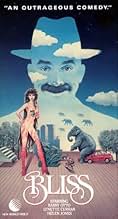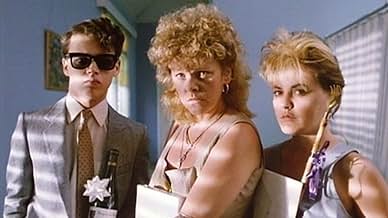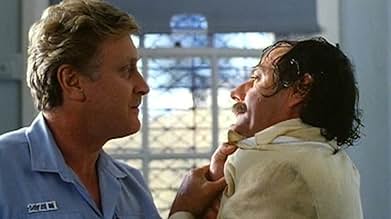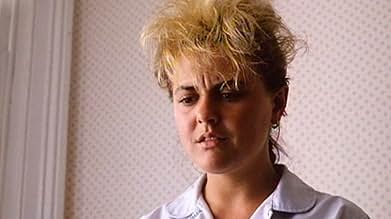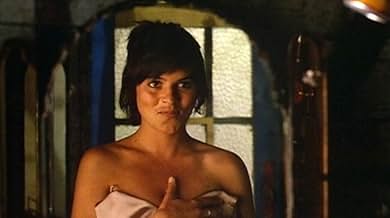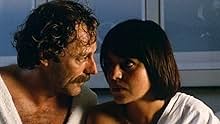Adicionar um enredo no seu idiomaAfter a near-death experience, a man wonders if he actually did die and is now in Hell.After a near-death experience, a man wonders if he actually did die and is now in Hell.After a near-death experience, a man wonders if he actually did die and is now in Hell.
- Prêmios
- 4 vitórias e 11 indicações no total
- Harry's Mother
- (as Sara De Teliga)
- Harry's Daughter
- (as Saski Post)
- Dwarf
- (as Marco Colombani)
Avaliações em destaque
This is a truly beautiful movie, at times scary, at times befuddling. Like the world Harry Bliss lives in, like the world we live in.
The tone is somewhat dark, the genre surrealist comedy, the performances deliciously eccentric, and the storytelling masterful. "Bliss" reminds me more of some of my favorite novels than it does any other films. Peter Carey's novel and adaptation have some of the feeling of John Irving's earlier works, but it's not derivative. The cinematography is gorgeous and understated. It has a surprisingly romantic core beneath a fairly jaded surface, which I think is a tough combination to pull off.
It isn't appropriate for kids (it has sophisticated, adult themes and, at moments, a very frank approach to sex) and it has an unexpectedly epic, languorous feel toward the end (so don't watch it when you're sleepy), but if you're serious about appreciating movies, you owe it to yourself to give this one a chance. Enjoy!
Harry Joy, an advertising executive, has a near-fatal heart attack - but when he recovers he is convinced he is in hell. And why not? His bitchy wife is having a torrid affair right under his nose, his son is trading drugs for sex with his own sister, and his ad agency represents the most destructive and polluting companies in town. Harry's life spirals out of control until he breaks away from his awful family and finds redemption in his love for the beautiful Honey Barbara.
Filled with extraordinary images, the film captures the surreal mood, the sense of hidden menace and the outrageous black humour of Carey's book, and brings the characters vividly to life.
Barry Otto, one of Australia's greatest actors, is perfect as Harry and he is brilliantly supported by an outstanding cast, including Lynette Curran as his horrible wife, Miles Buchanan as his evil and depraved son, Gia Carides as the daughter, and especially Helen Jones as his hippy 'innamorata', Honey Barbara.
If you can find it, the longer "director's cut" version is a must-see, for the amazing police-station scene - inexplicably removed from the initial release version - where Harry, under arrest after a series of bizarre and hilarious incidents, transfixes the cops with one of his famous stories. Barry Otto delivers an electrifying monologue, in one long, unedited scene, with the camera gradually pulling closer and closer to an extreme closeup of his face.
"Bliss" is director Ray Lawrence's only feature film to date - but one perfect film is better than ten duds!
But at least this is a fault on the right side.
It's as if "Bliss" were a repository, or a central font, of all of the offbeat black humour, all the odd characters, and all the quirky local colour, to have appeared in every Australian film made since. This isn't a bad thing. (My earlier complaint is that its ferociously luxuriant growth could have been cut back by a third and it would STILL have contained all the offbeat black humour, etc.) What makes it great is that it's more sincere than any of its imitators. A mere seventeen years old, it seems to date from a magical, all-but-forgotten pre-digital age, when we REALLY made films, and didn't just play at doing so.
On reflection: I don't care if there IS too much here. So much of it is so good, like the prim, fascist manager of the lunatic ward, the scene in which the cancer map is unveiled (Lawrence makes much out of a mere conversation in a hotel room), and the "love letter" to Honey Barbara. The strength which flows through the film's limbs is probably inherited from the era in which it was made. This decade (from a few years into the 1980s until a few years into the 1990s) saw Australian society at its most optimistic, tolerant and decent. We've come a long way downhill in the short time since.
Barry Otto plays a man with a lot of personal conflict, and a strange sort of charisma. He's a storyteller above all, and that's what "Bliss" is also most interested in. Creating real people first, then putting them into the plot. Everyone is developed as much as they need to be, fleshed out to surprising degrees. Barry Otto is very good as the storyteller, but the really surprising bit is the performance of Helen Jones.
There's certainly flaws to the film as a whole. It goes too far down certain trails, gives too much importance to some events that don't necessarily lead forward. But the best parts are amongst the best bits of any film of this style, so the missteps can be forgiven. If you like slightly messy, mostly brilliant, mostly forgotten films, "Bliss" is perfect for you.
Você sabia?
- CuriosidadesWas shown on Australian Broadcasting Corporation (ABC) by John Hind on his film show, and created a mass controversy due to the film's sexual content. The complaints at the time created the most criticised event ever on the ABC.
- Citações
Adrian Clunes: Y'know Harry, where exactly are you going to draw the line? If you fire us, you have to fire all the clients.
[Oyster flies off his fork]
Adrian Clunes: I'm sorry. Now listen: they release about 18,000 totally new organic compounds every year; none of them are properly tested. God knows how many cause cancer! The whole of the Western world is built on things that cause cancer. They cannot afford to stop making them!
[pause]
Adrian Clunes: Oh, for Christ's sake, look at your clients. Austrol had benzine in petrol; which is a carcinogen. Mitsuzi use it making tires! And we, we use saccharine, and even if we switch to cyclamates instead, they're just another suspect. And that other lot, your dry cleaning companies, use carbon tetrachloride! And every time
[pause]
Adrian Clunes: an announcement is made that something might cause cancer, people are less worried because they cannot believe it possible that half of what they breath and eat
[pause]
Adrian Clunes: is going to kill them.
- Versões alternativasThe version originally screened at the Cannes Film Festival ran 135 minutes.
- ConexõesFeatured in Reading Australian Film (1988)
Principais escolhas
- How long is Bliss?Fornecido pela Alexa
Detalhes
- Data de lançamento
- País de origem
- Idioma
- Também conhecido como
- Bliss
- Locações de filme
- Iron Cove Bridge, Sydney, Nova Gales do Sul, Austrália(Harry driving bent car scene)
- Empresas de produção
- Consulte mais créditos da empresa na IMDbPro
Bilheteria
- Orçamento
- AU$ 3.400.000 (estimativa)

